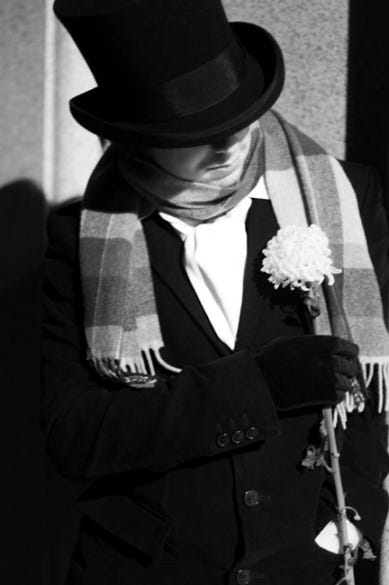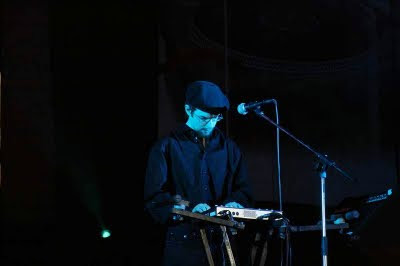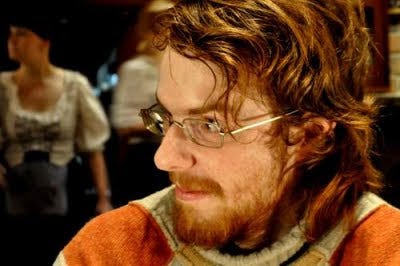This article was originally published at CoreGamers on February 11th, 2010
Following the controversial and broadly misunderstood PATHOLOGIC, THE VOID is Ice-Pick Lodge’s arduous encore, a passionate re-commitment to their pursuit for the lugubrious and the inauspicious. Some time after its original release in Russia in the year 2008, when and where it was known as Тургор (Turgor, meaning Tension) this cyclical, color-starved journey of anguish was published in selected European countries, later making its way to Steam. Transitioning from its initial state of obscurity into the faint limelight of independent computer game press coverage, it merited some of the most favorable and outwardly enthusiastic reviews among mainstream publications in the year 2009; praised for the audacity of its game play mechanics and provocative interweaving with its peculiar choice of themes and motives. Despite its moment in the sun, and perhaps inevitably, THE VOID now seems to persist as an object of cult following, sooner than a paradigm shift capable of reshaping the course of commercial game development.
It has been my habit in recent years to emphasize one single work among the several propositions presented each year in the field of video game music. Far from an award attribution initiative or the proclamation of a superior example from among a wealth of inspired creations, I intend only to single out those compositions whose intrinsic qualities and relevance may have been overlooked. This year, I’ve had the rare privilege to contact the author of the soundtrack of my selection. During the course of our exchanges we discovered of a mutual fascination for subjects as varied as early experimental electronic music and pipe smoking.
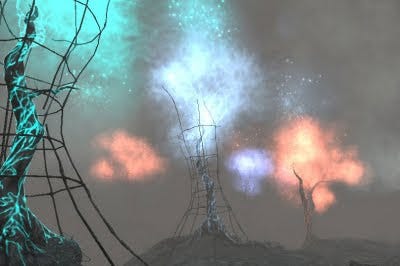
In his debut as a score composer, Wasily Kashnikov (a.k.a. Mushroomer) has teamed with Andriesh, a fellow muscovite DJ who also participated in the making of PATHOLOGIC. This partnership has resulted in an almost unprecedentedly extensive soundtrack album, at least in the context of independent game creation, first released in 2008 in tandem with the game, subsequently re-edited with additional themes and re-mastered versions. If THE VOID is an erudite reflection on the complexities of life and death, Kashnikov’s fascinating personality and musical talent lent a valuable contribution to this achievement. Enigmatic and brooding, his soundscapes and montages are highly reminiscent of the work from British electronic music pioneers like Aphex Twin and his Selected Ambient Works, or FSOL during their ISDN and Lifeforms phase.
To match the diversity of abstruse contexts presented throughout the game, the young musician applied different instruments and sororities from the soft chords of a resonating piano to the sharp-sounding wooden flute and guitar, blending them together employing carefully tweaked VST software generated effects and putting the KORG Electribe EM-1 to good use in crafting distinctive drum patterns. A professed self-taught musician, Mushroomer has embellished this transcendental journey with a plethora of organic sounds which succeed in both setting the appropriate tone and expanding the depth of an already intricate premise.
COREGAMERS: There seems to be no doubt that the worldwide release of The Void has contributed immensely in divulging of your music. Was this your first experience in the field and how did you acquaint yourself with the Ice-Pick Lodge studio founders?
VASILY KASHNIKOV: My first experience with the game development industry was long before I met Dybowskiy and the Ice-pick Lodge studio. We had a team of enthusiasts called Temporal Games, in which I took part in the development of a fantasy RPG, as a coordinator, sound producer and game designer. You know, the kind of teams, where each member does everything he can. in However, the project was never finished, as it often happens.
But my participation in the project allowed me to visit the KRI Conference (Russian analog of GDC) and meet a lot of wonderful people, who later helped me a lot. So, by the time I began discussing with Nikolay the possibility of working on the new Ice-Pick Lodge studio project, I was already well acquainted with the process of creating games. Nikolay then game me a test task, explained the concept of music and sound and in a few months, having successfully passed the test, I began to work in the studio. Now I can say without exaggerating, that this was the most comfortable, interesting work in my life so far. We’ll see, if something beats the record.
CG: Apart from your work, the soundtrack also features several themes from Andriesh, who had already collaborated with the studio on the production of Pathologic. How was the work assigned to both?
VK : When I began working, the first thing I did was listen to all the material, that Andriesh has written. Then I asked Nikolay to select the tracks that fit the Void conception best, and started to look for the sound that would work well with what was already written; that wouldn’t contrast with it too much. Besides that, I immediately took most of the sound design and special effect work. We didn’t work together in the traditional sense – I wrote music while sitting at the Ice-pick office, and he worked from home.
There isn’t a single track in the Void which we would’ve written together, though I think it would have been an interesting experience, but alas it never happened. Speaking of Andriesh’s music, I’d like to note, that I was very impressed by his Pathologic soundtrack, but I don’t like his solo projects as much. I’m not much of a dance music fan, I guess.
CG: Tallying up the themes from all the different versions, the soundtrack spans over an impressive four disc collection featuring dozens of original compositions. What challenges derived from the creation of such a vast enterprise?
VK : The greatest difficulty in writing the music was to find the right sound: the types of instruments, harmony of how everything sounds. It was hard to achieve the integrity of the entire soundtrack. When I finally found the right sound – everything became a lot easier. More than half of the tracks were written in mere months – 2 or 3 to be precise. And finally, when mentioning the large volume of the final product, don’t forget, that the 3rd disk simply contains poems, and the 4th disk contains not only new tracks written for the English release, but also re-mastered original tracks. And writing and re-mastering music – are definitely not the same in terms of time spent.
So, the main result of work on the Void is the first disk. The second disk is more like an alternative version of the soundtrack – what it might have been, and half of the tracks from disk 2 are unreleased material written by Andriesh. It was also difficult to remake tracks, the sound of which seemed almost perfect, but that didn’t suit Nikolay for some reason. For example, the main menu theme exists in 3 or 4 variations. “Strange Creatures” from disk 2 – is one of the unapproved variations of the main menu theme.
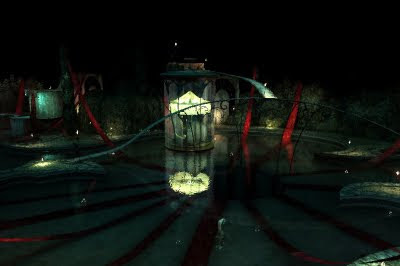
CG: The Void is an unconventional game by design. Its unique environment creates a sensation of emptiness and oppression that is impossible to evade. Every location is a mystery in itself; and even characters are mystifying and ambiguous. What is your interpretation of the game and how has that shaped you contribution to the project?
VK : That’s a good question. I based my view on the description Nikolay gave me way back at the first test task – this was a dying world, this was the wait for the birth of something new, the theme of famine, and finally the theme of being able to create something seemed to be the stem of the entire game. Anyhow – for me the Void was a metaphor of art, as a battle of the dying old with the upcoming to change it new, and the realization of a dream. I guess it sounds confusing – but there aren’t enough words to describe it – personally, I think that all of us realized a dream in this game. At least, I did.
CG: Being Portuguese, I was very surprised to see how the game opened with a feminine voice’s declamation of a poem by Luís de Camões. Do you know how did this idea come about?
VK : To be honest – I don’t have a clue. I didn’t take part in selecting the poems for the game, but I can assume, that this poem was meant to fully describe, what should be happening in the consciousness of the player during the game, and it’s a great way to introduce the players with the poetry, they otherwise might have never heard.
CG: The game’s soundtrack – your themes in particular – reflect a great passion for different styles of electronic and IDM music. What where the greatest influences and inspirations when you were creating the music?
VK : If you’re asking about what I was listening at the time, then… From electronic music it’s Boards of Canada, Bonobo and Carbon Based Lifeforms. From others I enjoyed Tom Waits, the Dresden Dolls, Nervous Cabaret – either way, its mastery and beauty in case of electronic tracks, and emotions in case of the ones with voice. And the result of this insane mix is what you have to “tolerate” the entire game -if you don’t choose to turn off the music, of course.
CG: Was there ever a sentiment of restriction, somehow, stemming from the fact that you were creating music for an interactive game?
VK: Speaking of the technical side of my work – I always kept in mind that I’m not just writing music, but an addition to an experience. My task was, beside all, to merge music and game play so that there’s no dissonance that would concentrate the player’s attention on either parts of the experience risking to damage several elements of the game. For example, the battle with the Triumphator brother is interactive – all his actions are reflected in the music themes, which sound during combat. Literally, you’re fighting the music that you hear! It’s a human orchestra after all!
Music from the battle against one of the brothers, the Triumphator: different variations were created in order to accord with the different stages of the conflict.
CG: There seems to be an interesting anecdote behind the choice of your artistic name Mushroomer? I’d be delighted to hear your version of what makes mushrooms so fascinating.
VK : I have a degree in biology, an agronomist, to be precise; and mushrooms are a very interesting life form even if not consumed. ;o) They are neither plants nor animals – they exist on their own, and nevertheless, have a great influence on our everyday. For example, alcohol (and even the Bible notes Jesus Christ turned water into wine) – is the result of work of yeast fungus – a form of mushrooms; many diseases that plagued humanity are the result of proximity to mold, and last but not least – mushrooms are tasty. So, I haven’t chosen this nickname for nothing – it’s best to be friends with such a mighty power of nature, rather than ignore it or be enemies.
CG: With only two games released, Ice-Pick Lodge has already collected a handful of awards, the support of a few influential critics and significant recognition from players. How is the audience is reacting to your work, specifically?
VK : Generally, the reactions are quite positive. Well, of course, I’ve met reactions like “where the hell did Andriesh go, and who the hell is this Mushroomer dude?”, I’ve seen people who think that there’s no actual artist named Mushroomer and all the music was written by Andriesh. But these are rare. Mostly people agreed that I did a wonderful job, and that’s twice as pleasant since I think so, too!
CG: Can we expect new collaborations with the studio in the future?
VK : Personally, I’m not working on anything now, when it comes to working on the new studio projects. But I suppose, as soon as it comes to sound – I’ll start working immediately.




